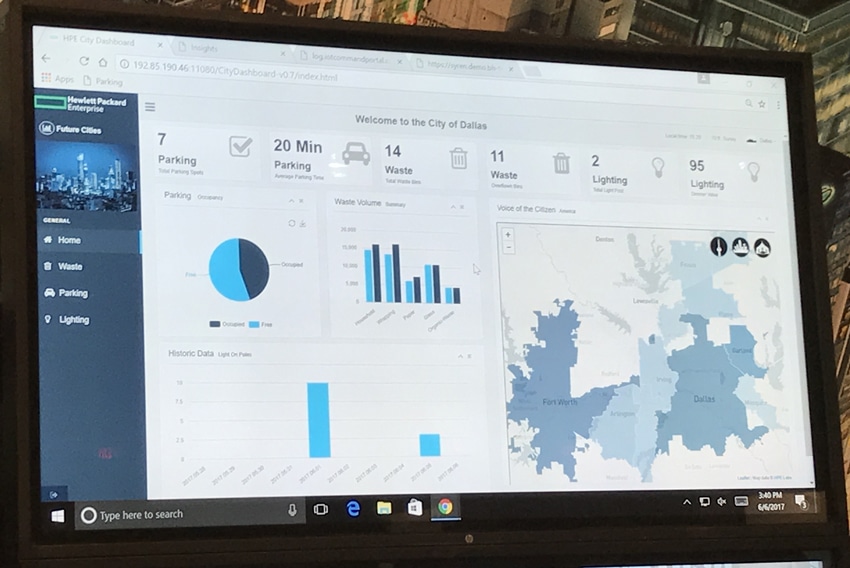![]() Today at HPE Discover 2017 in Las Vegas, Hewlett Packard Enterprise (HPE) showcased its partnerships in creating and expanding smart cities. HPE is partnering with Tata Communications to convert the “Steel City” of Jamshedpur in Jharkhand, India, to a smart city. HPE is also partnering with PwC (a long time global strategic alliance partner) to bring its Universal IoT Platform to support development, testing, and management initiatives of IoT applications in PwC’s Smart Cities Experience Center.
Today at HPE Discover 2017 in Las Vegas, Hewlett Packard Enterprise (HPE) showcased its partnerships in creating and expanding smart cities. HPE is partnering with Tata Communications to convert the “Steel City” of Jamshedpur in Jharkhand, India, to a smart city. HPE is also partnering with PwC (a long time global strategic alliance partner) to bring its Universal IoT Platform to support development, testing, and management initiatives of IoT applications in PwC’s Smart Cities Experience Center.
Today at HPE Discover 2017 in Las Vegas, Hewlett Packard Enterprise (HPE) showcased its partnerships in creating and expanding smart cities. HPE is partnering with Tata Communications to convert the “Steel City” of Jamshedpur in Jharkhand, India, to a smart city. HPE is also partnering with PwC (a long time global strategic alliance partner) to bring its Universal IoT Platform to support development, testing, and management initiatives of IoT applications in PwC’s Smart Cities Experience Center.

At the Mobile World Congress, HPE and Tata Communications announced a partnership to build world’s largest LoRa network deployment (targeting 400 million people throughout India). The two companies are now working with Jamshedpur Utility Services Company (JUSCO) to convert Jamshedpur into one of the first smart cities in the region.
Working with Tata, HPE will deploy and aggregate a wide array of field sensors, gateways and devices, and integrating multiple data sources to be seamlessly managed by JUSCO. Within the next year and a half the companies will use over 100,000 sensors and gateways to digitize 15 infrastructure solutions including street lights, utilities, and parking meters. All of these devices will be managed by HPE’s UIoT Platform, a software platform that makes it easy for Communications Service Providers (CSPs) and Enterprises to onboard new IoT use cases and rapidly achieve successful outcomes.
All of the data gathered will be brought into the Smart City Command Center enabling JUSCO to improve basic utility functionality while also more easily managing, maintaining, and monetizing new services. The main goals that all involved are looking for are reduced energy use across the city, increased efficiency for waste management, and increased safety in construction zones.
HPE has implemented the world’s first LoRaWAN, a Low Power Wide Area Network for wireless battery operated IoT devices, targeting key IoT requirements such as secure bi-directional communication, mobility, and localization services. HPE states that LoRaWAN is quickly being adopted as a standard for connecting LPWAN IoT devices and sensors, complementing other connectivity options such as LTE, Wi-Fi and more.
HPE is moving past Jamshedpur with smart cities to work with PwC. The two companies will pool their technology together to help major cities all over combat challenges stemming from urbanization and the associated social, environmental, and economic issues. PwC is able to manage cities’ endpoint devices such as smart utility poles, traffic junctions and intelligent waste bins collecting data as it does. PwC will be able to provide insights that are more predictable and repeatable. Together the two companies will accelerate IoT adoption and utilization giving governments and municipalities greater time to value.
Sign up for the StorageReview newsletter

